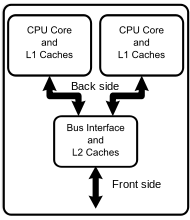I’m wondering what the difference is for the normal programmer?
Almost every new system out there has a multi-core architecture; but does that mean we can start cutting our games up into bunch of threads?
One thread running the game-logic-loop, and one thread running the render-buffer-loop?
Intel said there will be 80-core systems out within 5 years (for datacenters though only), but for desktop computers we already have multi-core systems (2-4 cores). I wonder when those 80-core systems will be out for desktops, we’ll be able to not only run game-logic and render in seperate threads, but also individual game objects, or other calculations.
It sure seems old to run a game in a linear fashion.
Has there any research been done into, hm, what can I call it, “Parallel Game Engines” | “Multicore Game Engines”?
Also, are modern OO languages outdated because of the complexity of writing synchronized multi-threaded applications? Will we all be programming in some other type of languages within 5 years?




